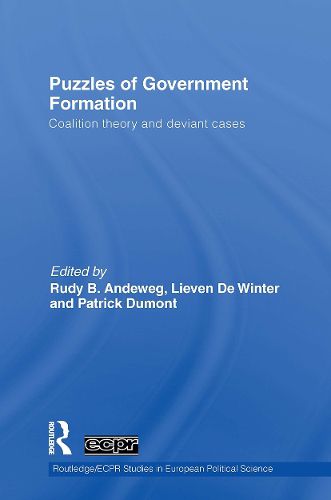Readings Newsletter
Become a Readings Member to make your shopping experience even easier.
Sign in or sign up for free!
You’re not far away from qualifying for FREE standard shipping within Australia
You’ve qualified for FREE standard shipping within Australia
The cart is loading…






Understanding the formation of governments has always been central to political science. Traditionally this topic has been considered from a rational choice theory perspective and the empirical testing of these theories; however neither approach alone is able to explain a large proportion of actual coalition formations.
This comparative volume brings together a rational choice theory perspective and the empirical testing of these theories to study government formation. It provides in-depth studies of government formations in Europe that cannot be accounted for by existing coalition theory in order to identify potential explanatory factors that have been neglected so far. These 'coalition puzzles' are reconstructed by country experts based on secondary sources, newspaper accounts, internal party documents, and interviews in an effort to understand why particular governments were formed. In conclusion, this book assesses whether new factors can be integrated into rational choice theories or whether these analyses point to the need for a different paradigm.
This important volume will be of interest to students and scholars of political science, European politics and comparative politics.
$9.00 standard shipping within Australia
FREE standard shipping within Australia for orders over $100.00
Express & International shipping calculated at checkout
Understanding the formation of governments has always been central to political science. Traditionally this topic has been considered from a rational choice theory perspective and the empirical testing of these theories; however neither approach alone is able to explain a large proportion of actual coalition formations.
This comparative volume brings together a rational choice theory perspective and the empirical testing of these theories to study government formation. It provides in-depth studies of government formations in Europe that cannot be accounted for by existing coalition theory in order to identify potential explanatory factors that have been neglected so far. These 'coalition puzzles' are reconstructed by country experts based on secondary sources, newspaper accounts, internal party documents, and interviews in an effort to understand why particular governments were formed. In conclusion, this book assesses whether new factors can be integrated into rational choice theories or whether these analyses point to the need for a different paradigm.
This important volume will be of interest to students and scholars of political science, European politics and comparative politics.